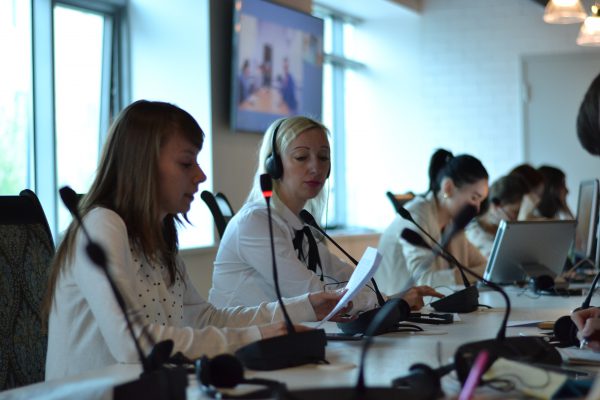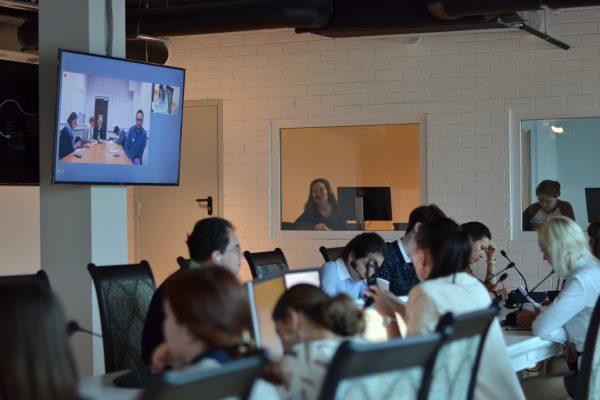New translation and interpreting technologies: evolution or disappearance of the interpreting profession?
 Did you know that according to psychological research during a phone talk on average about 20% of information is perceived, while interacting face-to-face you get 80% of information and during a videoconference – 60%? That is to say that if during communication via the sound (auditory) channel a visual non-verbal language (gestures, facial expressions, etc.) is added, the efficiency of perception of information is increasing. That is why one of the most effective and useful classes for MA students of the Caspian School of Interpreting and Translation are virtual classes with foreign partner universities. These types of classes help students to get great study skills, learn quickly and improve authentic foreign speech and convey emotions and mood of the speaker.
Did you know that according to psychological research during a phone talk on average about 20% of information is perceived, while interacting face-to-face you get 80% of information and during a videoconference – 60%? That is to say that if during communication via the sound (auditory) channel a visual non-verbal language (gestures, facial expressions, etc.) is added, the efficiency of perception of information is increasing. That is why one of the most effective and useful classes for MA students of the Caspian School of Interpreting and Translation are virtual classes with foreign partner universities. These types of classes help students to get great study skills, learn quickly and improve authentic foreign speech and convey emotions and mood of the speaker.
On May, 3 the Caspian School of Interpreting and Translation had a virtual class with one of its long-time partners – London Metropolitan University. The topic of the class is perhaps the most urgent for interpreters and translators and for those who chose these professions for their future career. Will modern technologies replace interpreters and translators? Would Google Translate be able to translate documents of hundreds of thousands of companies? Would further improvement of neural networks be able to deliver consecutive and simultaneous interpretation without a person? Don’t panic, let us make things clear.
However, making things clear isn’t enough for a virtual class, you should also interpret!
 Speakers of both universities prepared very well: James Harris from London Met University told about opportunities of remote interpreting training and Yakovleva Elena, the teacher of the Caspian School of Interpreting and Translation shared her opinion on the prospects of using of modern neural machine translation system Google Neural Machine Translation (GNMT). The MA student of the CSIT Polina Karabalaeva and the student of Metropolitan University Roman Lososovsky also delivered their speeches. It’s remarkable that several speakers mentioned the developments in the field of machine translation, which the Japanese are planning to use for holding press conferences at the Olympic Games in Tokyo in 2020. Details as it is characteristic of the Japanese scientists, are kept in strict secrecy. Should we be afraid for the future of one of the most important professions of all times?
Speakers of both universities prepared very well: James Harris from London Met University told about opportunities of remote interpreting training and Yakovleva Elena, the teacher of the Caspian School of Interpreting and Translation shared her opinion on the prospects of using of modern neural machine translation system Google Neural Machine Translation (GNMT). The MA student of the CSIT Polina Karabalaeva and the student of Metropolitan University Roman Lososovsky also delivered their speeches. It’s remarkable that several speakers mentioned the developments in the field of machine translation, which the Japanese are planning to use for holding press conferences at the Olympic Games in Tokyo in 2020. Details as it is characteristic of the Japanese scientists, are kept in strict secrecy. Should we be afraid for the future of one of the most important professions of all times?
The participants of the conference unanimously state that you shouldn’t. No technology is capable to cope with the metaphoricity of the literary text, to transmit a word-play or a pun, to understand the complexity of scientific terminology, to distinguish any dialect or an illiterate English speech (including pronunciation) of non-native English speakers. To reach all these goals, the machine needs at least to have artificial intelligence and as a maximum it should have an intuition, an ability to predict the speaker’s way of thinking and to distinguish irony, overtones, references and implied ideas. That means it needs…. to become a person ![]()





